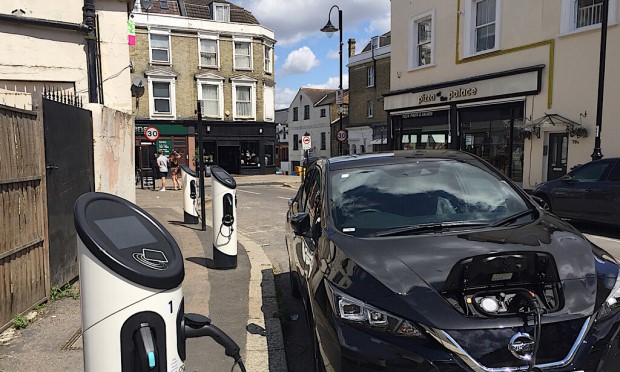Town Hall to ramp up installation of electric vehicle charging points across the borough

The Town Hall is to speed up work on Hackney’s electric vehicle charging points (EVCPs) beyond its own targets as it continues to bear down on car ownership in the face of the climate emergency.
Recently released procurement plans show that the borough has so far installed 118 EVCPs, with funding and plans in place to bring its total to 296 by the end of 2021.
Transport chief Cllr Mete Coban says the figures put the borough “on target” to meet its 2018 commitment of a charging point within half a kilometre of every household.
The Town Hall thinks it will need 3,000 EVCPs in Hackney by 2041 “simply to meet demand” – a requirement the council is now proposing to supply by 2030 through partnerships with outside contractors.
Cllr Coban said that data shows transport is the second biggest polluter in Hackney after domestic energy use, and added: “Hackney is already on target to meet the Mayor Manifesto Commitment from 2018 to provide charge points within 500m from every household, currently installing 95 additional charging points, which by the end of 2021 will add up to the total number of 296 points.
“The council is taking one step further to deliver a much more ambitious plan that includes meeting the current demand for charging points, and offering charging points in areas where the demand might be lower as an encouragement for our residents to switch to the cleaner vehicle.”
Residents can expect both high provision of EVCPs as well as “parking restraint measures” as part of the borough’s plans to accelerate a switch to electric vehicles.
The borough is hoping that providing a large amount of points will address “consumer anxiety around the availability of charging” – one of the key reasons behind a reluctance to go electric.
Procurement plans show the Town Hall is hoping to appoint providers for rapid charging points, fast charging points, on-street residential points and points for its own fleet, with the partnership model aiming to “prevent the council from taking a financial exposure of funding the infrastructure ourselves”.
The borough’s transport strategy aims to reduce car ownership in Hackney from 39,700 by 2021 to 32,300 by 2041, while noting the potential equalities impact of the plans, with electric vehicle drivers currently tending to be in the wealthiest income brackets.
Commitments baked in to the plans for the charging network include the creation of local jobs, to distribute EVCPs in areas where uptake is low, including areas with higher poverty rates, and to support disabled users, blue badge holders and residents in restricted parking zones or Low Traffic Neighbourhoods.
Coban added: “In 2020, central government announced an end to sales of new petrol and diesel vehicles from 2030. It is clear from this development, and in light of the climate emergency, that the council must take a more ambitious and proactive position on electric vehicle charging.”
You can find out more about the borough’s network of EVCPs here.
